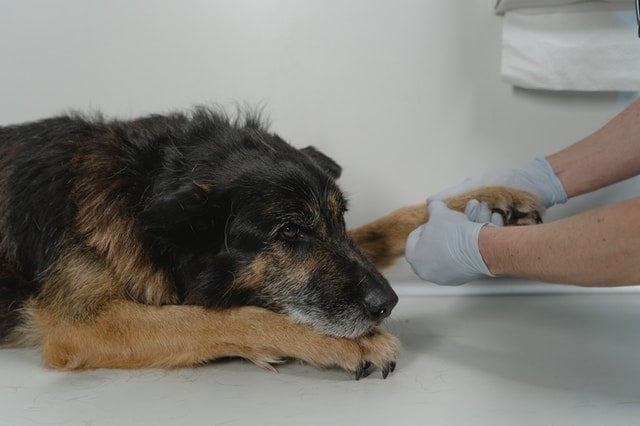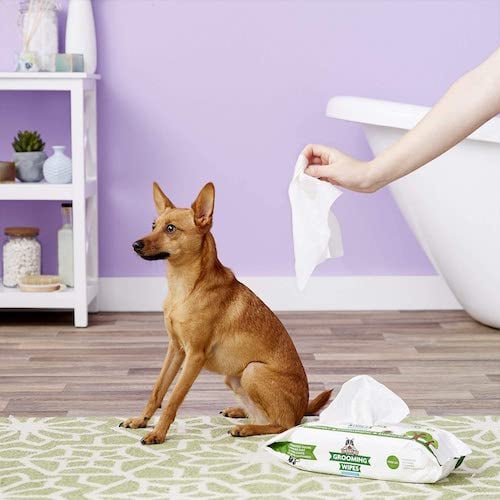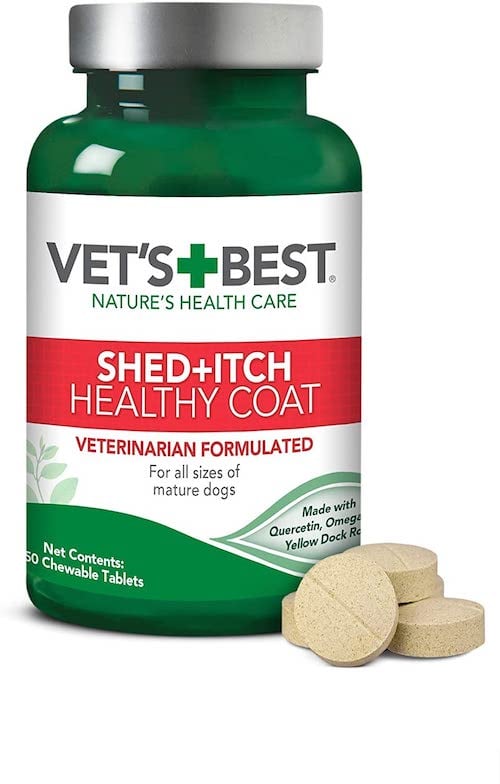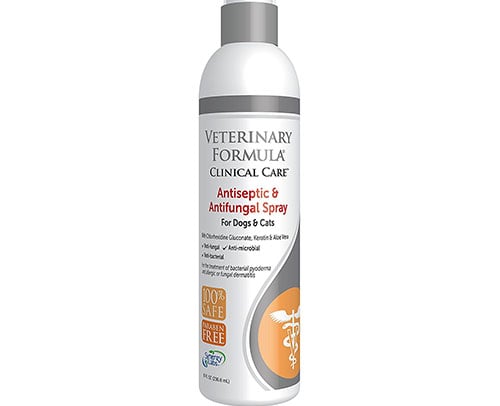- This post contains affiliate links. Read more here.
- Not a substitute for professional veterinary help.
Is your dog an obsessive licker? Does he frequently scratch or scoot across the floor? Just like humans, your furry friend can have a reaction to environmental factors like pollen and wind up battling dog allergies. In this article, we talk with veterinary dermatologist Dr. Nicole Eckholm to find out how to spot, treat, and stop atopic reactions in your pup.
Note: If you’re looking for info about your own pet allergies, not your pup’s, don’t worry—we’ve got you covered with this separate guide to dealing with your own dog allergies.
How to Spot Dog Allergies
There are four main types of allergy in dogs: atopic, flea, food, and contact. Atopic allergies are environmental; a dog’s body releases excess histamine when exposed to higher concentrations of pollen in the air, which prompts symptoms. This article focuses mainly on environmental allergies. If you suspect food is the culprit, the next step is testing a limited-ingredient diet and a talk with your vet.
So how do you know if an allergy is atopic? The itching will likely start seasonally, and the symptoms will typically follow a familiar pattern when a particular month or time of year rolls around:
- Itchy skin
- Scratching
- Biting
- Chewing
Dogs with allergies will often lick and scratch until they get “hot spots,” which look like red, inflamed sore patches on their skin. If you notice a hot spot on your dog, it’s best to have a vet take a look at it to determine the best treatment.
But there’s still a lot you can do at home, including prevention—and a handful of at-home products and tips can help make allergy season a lot easier on both you and your dog.
At-Home Treatment Options and Helpful Hints
1. Wipe down your dog to remove allergens after walks.
Pet grooming wipes are a quick way to remove dander and allergens when a full bath isn’t possible. We like the fragrance-free, hypoallergenic Pogi’s wipes.
Buy Now on Amazon Buy Now on Chewy2. Try a hypoallergenic dog shampoo.
Baths help to control the amount of allergens on your dog’s skin. Vet’s Best Allergy Itch Relief Shampoo for Dogs ranks high on our list of favorite shampoos for dogs with skin allergies. The formula was guided by veterinarians, and it contains essential skin-soothing ingredients like aloe, oatmeal, and tea tree oil.
Buy Now on Amazon Buy Now on Chewy3. Use supplements such as biotin or omega-3 chews.
or omega-3 chews.
Biotin and omega-3 fatty acid supplements help to suppress itching and improve coat health. Vet’s Best also offers well-regarded natural supplements to combat seasonal allergies—though we recommend checking in with your vet before you start offering your dog supplements, since it’s important to make sure they’re compatible with your pup’s system.
Buy Vet's Best Supplements on Amazon Buy Biotin on Amazon Buy Omega-3 Chews on Amazon Buy Omega-3 Chews on Chewy4. Consider Sulfodene treatments.
Sulfodene products use an FDA-approved formula for treating irritation, red skin, and hot spots in particular.
Buy Now on Amazon Buy Now on Chewy5. Apply a gentle medicated spray.
This popular choice from SynergyLabs helps to treat fungal and bacterial skin infections—plus it contains soothing aloe.
Buy Now on AmazonGetting Relief: Medical Treatment Options
Do you pop a Benadryl or Claritin when your allergies act up? The first stop for getting your pet relief is the same: antihistamines!
Unfortunately, antihistamines don’t work for every pup—they’re effective for about 30% of dogs. The biggest problem is that they tend to be a short-term solution for treating dog allergies, since they often lose effectiveness over time.
“If an antihistamine is effective, you could carry that out as long as it lasts,” Dr. Eckholm explains. “Sometimes, you can manage allergies just with that. Other times, as allergies progress, antihistamines are no longer effective.”
If you’re ready to try antihistamines, it’s important to consult your vet to determine which antihistamine is best and get a specific dosage for your dog.
The next option is stronger medication—corticosteroids. Steroids are much more effective at treating dog allergy symptoms, but they’re not recommended for long-term use because of the possibility of severe side effects. But don’t be hesitant to consult your vet about steroids because of the stigma—they can be very effective even in small doses and can help give relief to an itchy pet.
“It’s about quality of life,” Dr. Eckholm reasons.
If you graduate to steroids, you should also pursue allergy testing at that time.
“Allergy testing and immunotherapy [allergy shots] are the gold standard for managing environmental allergies,” Dr. Eckholm says. “Allergy shots are the only effective method to stop the progression of allergies.”

Tima Miroshnichenko / Pexels
Dog allergens are tested much the same as human ones; allergens are numbered and injected into the skin along with a positive and negative control. If the dog has a reaction, a hive or welt appears within 15 minutes of the injection. The vet administering the test will look at each hive and determine the degree of redness, which determines which allergens are the most significant. All of the allergens are then mixed together in various concentrations to formulate the allergy shot.
The concentration of the allergens in the shots will increase slowly over time in order to desensitize your pet’s immune system. It takes six to nine months to start seeing those results. Allergy shots have an 80% success rate, and although a dog may not see 100% improvement, Dr. Eckholm still thinks it’s worth it to try the shots.
“If the dog is greater than 50% improved, it’s worth continuing the allergy shots,” Dr. Eckholm suggests. “Again, it’s about quality of life for your pet.”
If your dog does not respond well enough to immunotherapy, the final option is immune-suppressants (or immune modulators), which suppress the immune system so that it will not respond to harmless allergens. The two drugs on the market are Atopica and Apoquel, but both can cause side effects, mainly vomiting and diarrhea but also an increased risk of infection from having a weakened immune system.
Dr. Eckholm says the chosen treatment depends on each individual dog.
“Every dog is going to be affected differently,” Dr. Ekholm says. “So it just depends on response to treatment.”
The Benefits of Allergy Shots for Dogs

Priscilla Du Preez / Unsplash
It’s tempting to think you might be able to avoid an allergen—but this usually isn’t possible, especially when that allergen comes from trees, grasses, and dust mites. “Pollen is carried in the air,” Dr. Eckholm explains. “It can be carried up to 30 miles in the air, and dust mites are everywhere.”
If you suspect your pet has an environmental allergy that you’re unable to treat at home, it’s important to seek immunotherapy treatment as soon as possible for your allergic pet for a number of reasons.
First, environmental allergies are progressive and will worsen as a dog gets older. Immunotherapy is much more successful in younger pets.
“The younger you allergy test a dog and start immunotherapy, the better they do,” Dr. Eckholm explains. “If a dog comes in as a senior, I don’t often recommend testing them because it’s not as effective.”
It’s also about quality of life for your pet. Just what does quality of life mean? Anyone with an allergic dog can tell you that relief from constant itching and scratching without having to keep your dog in a cone 24/7 is worth it! If you don’t cone your dog, you risk him developing painful hot spots from incessant licking. Who wants their dog to live like that?
Also, dogs will often develop secondary bacterial infections as a result of their allergies. These are managed with antibiotics, which also become less effective over time.
“Secondary bacterial infections can become resistant with the repeated use of antibiotics, making it more difficult, and expensive, to treat these infections when they arise,” Dr. Eckholm says.
The Testing Process and Giving Shots
The intra-dermal testing process is actually quite easy—and not traumatic!—for you and your dog. The vet dermatologist will need to shave a 4 by 6 inch patch of hair on your dog to inject the allergens.
Your vet dermatologist will inject the most common allergens in general, and the ones specific to the region where you live. Overall, they will test roughly 50 different items to get the best idea of what your dog is reacting to.

Tima Miroshnichenko / Pexels
Your dog will react within minutes with varying degrees of redness, or no reaction at all. Your dog’s allergy shot will be formulated based on the severity and number of reactions.
Depending on the severity of allergies, you will be required to give an allergy shot every other day for 30 days, then once a week for a year. Maintenance will depend on your dog’s response.
For example, after a year of consistent shots, my dog only needs a shot every three to four weeks or so, which is very cost-effective to maintain.
If you are skittish about physically giving your dog an allergy shot, there is another option! The alternative is sublingual immunotherapy—SLIT for short—in which you squeeze a pump filled with medication into your dog’s mouth, typically under their tongue. “About a third of people choose that route, either because they’re afraid their dog will bite or they don’t want to do injections,” Dr. Eckholm says.
Who Is at Risk
About 10% of all dogs develop environmental allergies. Some dog breeds are more susceptible, including the following:
- Retrievers
- Terriers
- Boxers
- Dalmatians
- Bulldogs
- Shepherds
- Beagles
- Irish Setters
If your dog does develop allergies, they should not be bred.
The Bottom Line
Environmental allergies are on the rise, and dogs are increasingly likely to have a reaction to a growing list that includes everything from trees and grasses to dust mites or even cats and cockroaches. Your pup can be pretty miserable and develop infections without treatment. While they may not be able to achieve a completely allergy-free existence, it’s worth it to see a dermatologist to try to give your pal a chance at a more comfortable life.








